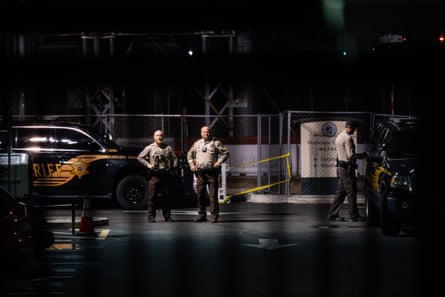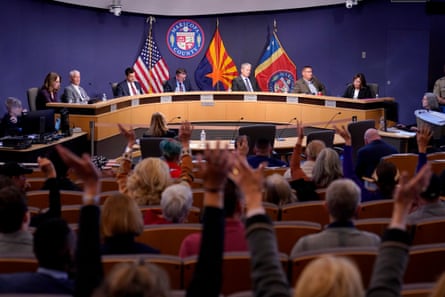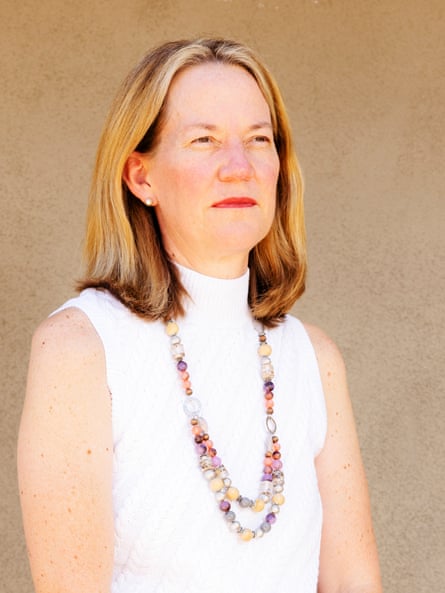On a glorious spring day in Phoenix, in an atrium beneath the majestic cupola of the old state capitol, the secretary of state, Adrian Fontes, is celebrating Arizona’s 112th birthday.
He solemnly recites President William Howard Taft’s proclamation welcoming Arizona as the 48th state of the union. Speeches fete the state’s breathtaking landscapes, from the mighty Grand Canyon to the sprawling deserts of Yuma and lush green forests of Coconino. Then, a cake iced with the state seal is cut into 112 pieces and devoured in the sun-dappled Rose Garden.
There is only one discordant note on this otherwise joyous day: who is that person standing silently and alert behind Fontes? Why is Arizona’s chief election administrator, responsible for the smooth operation of November’s presidential election, in need of a bodyguard?
“It’s very sad,” Fontes said. “It’s a sad state of affairs that in a civil society, in one of the most advanced civilizations that anybody could have imagined, we have to worry about physical violence.”
These are troubled times in Arizona. Until 2020, election officials were the largely anonymous folk who did the important yet unseen work of making democracy run smoothly.
“Nobody knew who we were, what we did,” Fontes said ruefully. “It’s a little bit different now.”
All changed with Donald Trump’s unprecedented refusal to accept defeat in the 2020 election. His conspiracy to subvert the election has had an explosive impact in Arizona, a battleground state that has become arguably ground zero for election denial in America.
In 2020, the Republican-controlled state senate sponsored a widely discredited “audit” of votes in Maricopa county, the largest constituency, which contains Phoenix. Republican leaders put themselves forward as fake electors in a possibly criminal attempt to flip Joe Biden’s victory in Arizona to Trump’s.
Two years later, in the midterms, armed vigilantes dressed in tactical gear stalked drop boxes in a vain hunt for “mules” stuffing fraudulent ballots into them. Amid the furore, election officials found themselves assailed by online harassment and death threats.
No longer faceless bureaucrats, they had become public enemy No 1.
With the likely presidential rematch between Trump and Biden just eight months away, Fontes, as the top elections administrator, is facing a formidable challenge. He is preparing for it like the marine veteran that he is.
The secretary of state is staging tabletop exercises in which officials wargame how to react to worst-case scenarios. What would they do if a fire broke out at the ballot-printing warehouse, or if a cargo train spilled its toxic load on to the facility storing voting equipment?
“Tiger teams” have been assembled to be quickly dispatched across the state to fix software or other voting problems. To anticipate bad actors using artificial intelligence to create malicious deepfakes of candidates, his office has done its own AI manipulations, making videos in which individuals speak fluently in languages they do not know such as German and Mandarin. “They were very, very believable,” Fontes noted.
Specialists from the Department of Homeland Security have been deployed to advise counties on physical and cyber security. Active-shooter drills have been rehearsed at polling stations.
As the Washington Post reported, kits containing tourniquets to staunch bleeding, hammers for breaking glass windows and door-blocking devices have been distributed to county election offices. “These are not things we would ever want to train anybody on,” Fontes said. “But given the environment … ”
With all this under way, Fontes insists he’s ready for anything. “We will prepare as best we can for any contingencies,” he said. “And then we have no choice but to march forward, hopefully.”

A single statistic underlines the looming danger hanging over the 2024 presidential contest. More than half – 53% – of Arizonans are currently represented in the state legislature by Republicans with a proven track record of election denial.
That arresting figure comes from the election threat index, a database compiled by the voting rights organization Public Wise. The directory is designed as an accountability tool, tracking local and state officials who spread misinformation and participate in legislation undermining democracy.
“This is a race to the bottom,” said Reginald Bolding, a Public Wise adviser and former Democratic minority leader in the Arizona house. “We are seeing the Republican party reward whoever’s most extreme about elections.”
All the big names in Arizona’s flourishing market in election denial remain active traders. Kari Lake, the Phoenix TV anchor who reinvented herself as a Trump acolyte, continues to deny her idol’s 2020 presidential defeat as well as her own failure in Arizona’s 2022 gubernatorial race; she is now running for a US Senate seat.
Mark Finchem, the former state legislator and member of the Oath Keepers militia who was present at the US Capitol insurrection on 6 January 2021, is attempting to return to the Arizona legislature in a state senate seat. He has founded an election-denial outfit, the Election Fairness Institute, and, as the monitoring group Media Matters has revealed, continues to brag about uncovering “phantom voters” while offering zero evidence.

Abe Hamadeh last month lodged yet another lawsuit claiming that Arizona’s attorney general post had been stolen from him after he lost the midterm race. Now he is vying for a congressional seat.
For seasoned political observers, the midterms were like a controlled experiment that proved that election denial is unpopular among most Arizonans. Prominent deniers lost all statewide elections in 2022 – Lake to Katie Hobbs in the governor’s race, Finchem to Fontes for secretary of state, and Hamadeh to Democrat Kris Mayes for attorney general.
“It was the perfect case study,” said Mike Noble, a pollster based in Arizona. “All the election deniers standing in statewide races lost, while everything else down-ticket went to the Republicans.”
Opinion polls tell the same story. A whopping 70% of Republicans nationally are still wedded to Trump’s baseless claim that the 2020 election was stolen from him. Yet such fondness for conspiracy theories does not translate to the general population.
Republicans form 34% of Arizona’s electorate. But 30% identify as Democrats and another 35% are unaffiliated independents – voting blocs that are much less susceptible to the stolen election lie.
Strangely, blanket statewide defeats do not appear to have dampened the Republican embrace of Trump’s deceit. “The rhetoric hasn’t stopped, terrible as it is for them,” Noble said.
If anything, the debate around stolen elections has intensified. “New political careers have been created out of it. A whole industry and infrastructure now exists to make sure that it perpetuates itself,” said Stephen Richer, the Republican recorder of Maricopa county tasked with maintaining the voter files of 2.6 million citizens.
Mayes, the state attorney general who is being sued – again – by Hamadeh two years after she beat him, is stark about the enduring strength of election denial. She was a Republican until 2019 when, dismayed by the direction in which Trump was dragging the party, she defected to the Democrats.
“The Republican party in Arizona has been taken over by a faction that wants to undermine our democracy by sowing seeds of doubt about our election system,” she said. “As a former Republican, I find that horrendous, and nothing short of heartbreaking.”

Of the first 13 cases prosecuted by the election threats taskforce, the unit set up within the US justice department in 2021 to protect election officials from the attacks unleashed by Trump, by far the largest number – five – relate to Arizona.
Two of those involved death threats against Fontes’s office, including a bomb threat. A third was a threatened lynching directed at Clint Hickman, a Republican on the Maricopa county board of supervisors.
The final two prosecutions both involved menaces against Richer. In one of the attacks, a Missouri man left a voicemail in which he warned the recorder to stop criticizing the state senate’s “audit” or “your ass will never make it to your next little board meeting”.
In an interview, Richer was hesitant to discuss the bombardment he and his family have suffered from fellow Republicans. But he did say this: “The fracturing of my party saddens me. There are people who I consider to be part of my tribe, part of my team, who now view me as a bona fide enemy.”
Even moderate Republicans who have long been forced out of the legislature are exposed to the aggravation. Rusty Bowers, the former speaker of the Arizona house who was ousted in 2022 for refusing to illegally overturn Biden’s win, has been out of office for 13 months but was still subjected on the day after Christmas to swatting – a fake prank anonymous call that brought police cars screeching to his house and officers scouring the premises.
Bowers has a take on why he is still attracting Maga wrath all these months later: “Fear brings people tighter together, justifying mistreatment even of your own. It all becomes magnified. You know, we’re falling apart.”
Arizona is suffering one of the severest brain drains of electoral knowhow in the country. Of its 15 counties, 12 have lost a top election administrator since the last presidential cycle, prised out by a constant barrage of bile.
Most of those quitting are women, a reflection of the predominance of female election officials and the often sexually charged nature of the threats.
Of the five members of the Maricopa county board of supervisors, two have announced they are not standing for re-election. Hickman, recipient of the lynching threat, said recently that “it’s gotten worse and worse … I thought I was looking way too much in the rearview mirror”.

The second departing supervisor is Bill Gates. In January, the attorney general secured a sentence of three years’ probation for a man who accused Gates of being a “corrupt Democrat” and threatened to poison him to death “multiple times”.
In fact, Gates has been a loyal Republican since he was a teenager – he set up a Republican club in his high school when he was 16. “I’m a true child of the Reagan revolution,” he said in an interview.
Gates had to evacuate his family from their home twice after being advised by the local sheriff they were in imminent danger. The low point came one Christmas when he posted a photo of his family on social media. A Trump supporter responded that his daughter should be raped.
As the pressure reached a boiling point, Gates was diagnosed with PTSD. Since then he has worked hard to stabilize himself through therapy, but he struggles.
It’s not just the death threats. Like Richer, he feels wounded that the attacks are coming from his own people.
“It’s my team that’s going after me,” he said. “Four of us supervisors are Republicans in Maricopa. We stood up for democracy, we stood up for elections that are safe and secure, and we’ve been called Rinos, traitors, Marxist communists on a daily basis.”
Gates said that there were several factors behind his decision, at this point, to leave public office once the presidential election is done. One of the largest is the trauma of these past four years.
He said he would leave the supervisor job with a heavy heart, as he regards it as the most important work of his professional life. He will also depart with foreboding.
“Democracy is teetering,” he said.
What does he mean?
“It is extremely difficult to win a Republican primary if you defend our election system. If that’s not teetering, I don’t know what is.”
Kris Mayes is on the frontline of efforts to hold together Arizona’s teetering democracy. As the state’s top prosecutor, she is painfully aware that the eyes of the world were on Arizona in 2020 and 2022, and will be again in 2024.
“Every election cycle, we seem to face a test,” she said, speaking in her office in downtown Phoenix. “I think we’re going to pass it, but it’s dangerous.”
Mayes has aggressively prosecuted those who allegedly violate election laws. Last year she secured felony indictments for two Republican supervisors in Cochise county in the south of the state who were refusing to certify 2022 election results.

In Mohave county, a deeply conservative community in the north-west, she intervened in a fierce dispute over hand counts. Republican supervisors were pressing for hand counts only, calling for the scrapping of vote-counting machines – a move that Mayes pointed out in a letter would be unlawful and could attract serious legal consequences.
She told the Guardian that her motive was deterrence. “We want to send a message that we will not put up with violations of the law, whether that’s sending a death threat to an election official or creating chaos in the election system,” she said.
Despite the attorney general’s efforts, those in the thick of the gathering election storm are on edge. Security has been increased at the Runbeck Elections Services factory where ballots are printed.
CEO Jeff Ellington said the aim was to protect staff and reassure voters that the process is watertight. Public tours of the factory have been stepped up. Extra cameras have been installed, and the facility has been reinforced against cybersecurity attacks. All trucks transporting ballots around the state and beyond are monitored with GPS.
Most tellingly, armed guards are stationed at the facility around the clock.
Ellington admits to being worried that the volatile events of 2020 and 2022 will repeat themselves. “People are very amped up. There’s a lot of misinformation out there. We’re just not a trusting nation right now,” he said.
Assuaging such fears is one of the attorney general’s top priorities. “My focus is making sure we protect our elections, and our officials, against threats of violence,” Mayes said.
One of her biggest pending decisions is whether to charge the 11 Republican “fake electors” who gathered on 14 December 2020 to cast “alternative” electoral college votes for Trump, even though by then his defeat had been confirmed. A “very serious investigation” is under way, she said, promising that it would be completed.
But she was coy about whether she would follow Georgia, Michigan and Nevada in pressing charges against the fake electors. “We’re spending the time we need to see that justice is done,” was her careful choice of words.
The attorney general’s decision will be of some interest to Jake Hoffman and Anthony Kern, leading Republicans in the state senate. They were among the 11 fake electors, and Kern went on to appear at the attack at the US Capitol on January 6.
The two senators are also key members of the Freedom Caucus, the alliance of far-right Republican lawmakers that dominates the legislature. Since the advent of Trump, the Arizona Republican party has moved relentlessly to the right, with the Freedom Caucus accumulating power while moderate Republicans have been driven out.
The Freedom Caucus is umbilically linked to Turning Point Action, the political arm of Turning Point USA, which is based in Phoenix. The group, under the leadership of the pro-Trump activist Charlie Kirk, has catalyzed the party’s rightward march.
Before he entered the legislature, Hoffman was head of communications for Turning Point USA. The group’s chief operating officer, Tyler Bowyer, is a close ally of Hoffman’s and represents Arizona on the Republican National Committee.
“Turning Point is now a national advocacy group for culture warriors,” said Chuck Coughlin, a Phoenix-based political consultant and CEO of Highground Inc. “They’ve taken over the Arizona Republican party.”
According to Public Wise, 12 of the 16 Republicans in the Arizona senate have participated in election denialism or other acts that undermine confidence in democracy. Of the 32 Republican state lawmakers listed on the election threats index, almost half have introduced anti-democratic legislation and 84% have voted for it.
Recent bills proposed by far-right lawmakers include:
House bill (HB) 2472, which would make it easier to challenge election results in court, removing legal hurdles that led to Lake and Hamadeh’s lawsuits being dismissed for lack of evidence;
Senate bill (SB) 1471 and HB2722, which would promote hand counts of all ballots, a key demand of election deniers who claim without proof that vote-counting equipment is rigged; and
(HB)2415, which would strip Arizonans from the early voter list whenever they fail to vote.
None of these bills have hope of being enacted, given the veto power of Hobbs, the Democratic governor. Last year she vetoed a record 143 bills, dismissing them with such tart remarks as “the 2020 election is settled” and “it’s time to move on”.
Of all the recent moves from Republican lawmakers, the most striking has been SCR1014, a senate constitutional resolution introduced in January by Kern. It rehashes a highly dubious judicial doctrine championed by Trump’s lawyer John Eastman in the buildup to the January 6 insurrection.
The “independent state legislature theory” claims that the US constitution gives state legislatures – as opposed to individual voters – the power to choose who becomes the next president. “The Legislature, and no other official, shall appoint presidential electors in accordance with the US Constitution,” Kern’s resolution bluntly states.
SCR1014 has no chance of becoming law – it would require a majority of Arizonans to back the idea in a ballot initiative, which in effect would be asking the state’s 4 million registered voters to disenfranchise themselves. But the resolution does lay down a road map of the Freedom Caucus’s intentions.
The Guardian invited Kern to explain his resolution, but he did not respond.
Sonny Borrelli, the majority leader of the Arizona senate and a fellow Freedom Caucus member, was willing to talk.
In his senate office, he began by reaffirming his conviction that Arizona’s 2020 result, which put Biden ahead by 10,457 votes, was unreliable. “I believe that it was an uncertifiable election, so whether Trump won or Biden won, we just don’t know,” he said.

He ran through several allegations of fraud, all of which have been thoroughly investigated and debunked. They included “video footage of people stuffing ballots” into drop boxes (the core of the discredited film 2000 Mules by the conspiracy theorist Dinesh D’Souza) and “22,000 dead voters’ signatures”.
Last year Borrelli sponsored SB1074, which would require all vote-counting equipment to be made exclusively out of US-manufactured parts. Hobbs vetoed that bill too, pointing out that no such machines existed.
Borrelli then went on a grand tour of Arizona counties, instructing election supervisors that they had to conform to a non-binding resolution banning electronic voting machines. “We need to go back to hand-count paper ballots,” he told the Guardian. “Anything is hackable, so why take that chance?”
November’s presidential contest will not be hand-counted in Arizona. The elections director of Maricopa county has estimated that it would take an additional 25,000 temporary workers to carry out a hand count of the presidential election, working nine-hour shifts for 25 straight days – a monumental feat that would set the county back some $71m.
Borrelli is confident that despite failing to secure hand counts, his side is ready for November.
“People throughout the state are stepping up. There will be a lot more volunteers at the polls, and they will be more aware. They are going to be watching better.”

What if the presidential contest erupts in a fiery dispute, as it did in Arizona in 2020? Could he conceive of Kern’s resolution being rolled out and the legislature wresting control?
“I believe our US constitution grants us the authority,” Borrelli said. “We have plenary authority over the presidential election, meaning we can choose the electors – the constitution says so.”
But wouldn’t that be overturning the will of the Arizonan people?
“How could you overturn the will of the people,” he said, “if the people didn’t actually get what they were supposed to be getting?”
The drive west to Borrelli’s constituency traverses moonscapes of dry cactus deserts, cracked rocky outcrops and windswept mesa. The politics of the 30th district are, like the scenery, unforgiving, rugged and proud.
First stop is Kingman, a scraggy town of 32,000 on Route 66. A bikers’ shop on the side of the highway sells Trump memorabilia and other Maga delights.
There are T-shirts imprinted with Trump’s scowling mugshot taken when he was charged with illegally trying to overturn the election in Georgia, above the caption: “Nuff said.” Confederate flags fly from the roof stamped with the motto “Heritage not hate”.
Maggie Passaro, 69, is a Kingman resident who at a public meeting of the Mohave county supervisors board in November became so distraught over hand counts that she almost burst into tears.
She tells her life story over coffee in the Route 66 diner. She inherited from her father strong anti-government leanings. “Little one, don’t ever trust the government, they all lie and cheat,” he would tell her.
As an adult, Passaro worked variously as a bartender, dancer, artist and caregiver to her ailing mom. She flirted with the Tea Party and with the birther movement that claimed falsely that Barack Obama was not American, but her true engagement with politics only came with Trump.
After her mother died, she became so detached from public life that she didn’t vote in 2016. On 20 January 2017, she was listening to a local radio station and was astonished to hear Trump’s inauguration speech – she hadn’t even realized he had won the presidency.
With Trump in the White House, she started burrowing down into online rabbit holes, following Cathy O’Brien and other conspiracy theorists. Her news source became the podcast of Trump’s former adviser Steve Bannon and the misinformation website of Dan Bongino.
A warm and affable woman, Passaro admitted freely that she tends to obsess over things. She watches online videos for days on end. “I won’t sleep until I’ve seen them all,” she said.
One such obsession is the alleged stealing from Trump of the 2020 election using rigged vote-counting machines. Passaro talked with animation about PCAPS – so called “packet captures” that Trump associates like the My Pillow founder, Mike Lindell, claim are proof that China controlled the machines.
By last fall, Passaro had become so incensed that when she heard that Mohave county supervisors were holding a public meeting to discuss hand counts, she vowed to be there. That’s when she almost wept: when she heard someone say that hand counts were too slow and expensive to adopt in Mohave county.
“I thought:‘Oh, you stupid ass!’” Passaro said, her eyes welling up again. “How much value do you put on your freedom? What’s your life worth? It’s priceless, you can’t put a value on it! You cannot have a life without freedom!”
Why was that moment so overwhelming for her?
“I do get very, very emotional,” she said.
Why?
“I’m afraid we’re losing our country.”
About an hour’s drive farther west is Lake Havasu City, a dusty desert city on the banks of the Colorado River. This is home to Ron Gould, the Mohave county supervisor who has spearheaded the push to scrap machines and move to hand counts.
When the Guardian asked Gould to give his take on why hand counts are so important, he offered a different analysis. He wasn’t touting PCAPs or Chinese hacking.
He even admitted that hand counts weren’t necessary in a place like Mohave. “Machines aren’t the big problem, it’s not really an issue in my county,” he said.
The paradox is that the loudest, most passionate expressions of election denial are being made in staunch conservative parts of the state where the results of ballots are never in dispute. Trump trounced Biden in Mohave county by 75% to 24% – a margin that nobody would challenge.

So why is Gould so fired up? At the public meeting in which Passaro teared up, he told the crowd that he was willing to go to jail if it meant his county could hand-count the ballot. He also recently sued Mayes over the attorney general’s letter warning of criminal charges if the supervisors switched to manual counting.
Gould explained his suit in personal terms: “I’m tired of them threatening me, that’s really what my lawsuit is about.”
But he cast his compulsion for hand counts in much more portentous terms. It was all about democracy, he said: “I’m concerned that people are losing faith in elections. I’m concerned that people will decide not to vote because they think it’s rigged, and then you lose the democratic process. If going to a hand count takes care of it, that’s why I back it.”
Gould is seeking to alleviate his constituents’ growing doubts about democracy by sowing doubts about democracy. Wouldn’t it be easier than moving to costly and cumbersome hand counts simply to tell his constituents that voting machines work?
“They’re hearing that from everybody, and that doesn’t make them believe it’s true. So if hand counts are what they want, I’m going to give them what they want,” he said.
Where does he think this could end?
“In a revolution, actually,” he said. “People are ginned up. They feel disenfranchised, disgusted, that they have no control over their lives or the political direction of their country. If they can’t solve it at the ballot box, then they’re going to do it in other ways.”
